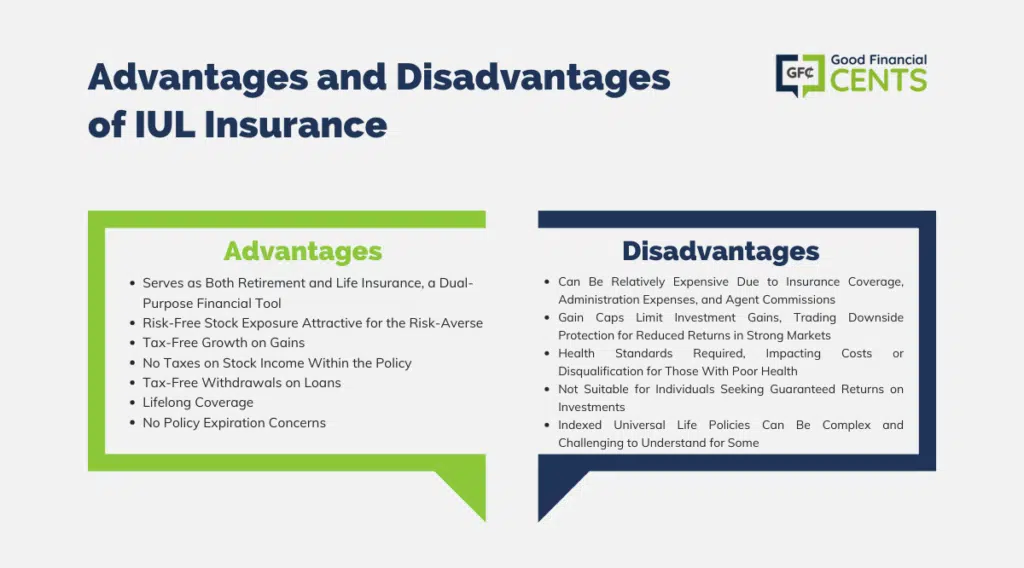All Categories
Featured
Table of Contents
1), frequently in an attempt to beat their classification standards. This is a straw male disagreement, and one IUL people enjoy to make. Do they contrast the IUL to something like the Vanguard Total Stock Exchange Fund Admiral Show no lots, an expense ratio (ER) of 5 basis points, a turn over proportion of 4.3%, and a phenomenal tax-efficient record of circulations? No, they compare it to some awful proactively taken care of fund with an 8% lots, a 2% ER, an 80% turnover proportion, and a terrible record of short-term funding gain circulations.
Shared funds commonly make yearly taxable circulations to fund proprietors, also when the worth of their fund has decreased in worth. Shared funds not just require earnings reporting (and the resulting yearly taxation) when the common fund is increasing in worth, but can likewise impose revenue tax obligations in a year when the fund has decreased in worth.
That's not exactly how common funds function. You can tax-manage the fund, collecting losses and gains in order to lessen taxed distributions to the capitalists, however that isn't in some way mosting likely to alter the reported return of the fund. Just Bernie Madoff kinds can do that. IULs stay clear of myriad tax obligation traps. The ownership of common funds may call for the shared fund owner to pay estimated tax obligations.

IULs are very easy to position to make sure that, at the proprietor's fatality, the beneficiary is exempt to either earnings or estate tax obligations. The same tax obligation decrease methods do not function virtually as well with shared funds. There are numerous, commonly expensive, tax obligation catches linked with the timed trading of mutual fund shares, catches that do not apply to indexed life insurance policy.
Possibilities aren't really high that you're mosting likely to be subject to the AMT because of your mutual fund distributions if you aren't without them. The remainder of this one is half-truths at best. For example, while it holds true that there is no income tax because of your successors when they acquire the earnings of your IUL policy, it is also true that there is no earnings tax due to your successors when they inherit a common fund in a taxed account from you.
Iul Insurance Pros And Cons
The government estate tax exception limit is over $10 Million for a couple, and expanding each year with inflation. It's a non-issue for the huge majority of doctors, much less the rest of America. There are better ways to prevent inheritance tax issues than buying financial investments with reduced returns. Common funds might create revenue tax of Social Security benefits.

The development within the IUL is tax-deferred and may be taken as free of tax revenue via fundings. The plan owner (vs. the mutual fund manager) is in control of his or her reportable income, thus allowing them to decrease or perhaps remove the taxes of their Social Protection benefits. This is great.
Here's an additional very little concern. It's real if you acquire a common fund for claim $10 per share simply before the circulation day, and it distributes a $0.50 distribution, you are after that going to owe taxes (most likely 7-10 cents per share) although that you have not yet had any kind of gains.
But in the long run, it's actually regarding the after-tax return, not just how much you pay in taxes. You are mosting likely to pay even more in tax obligations by utilizing a taxed account than if you get life insurance. You're also probably going to have even more cash after paying those taxes. The record-keeping requirements for owning mutual funds are substantially extra intricate.
With an IUL, one's records are kept by the insurance company, copies of annual declarations are mailed to the proprietor, and circulations (if any) are totaled and reported at year end. This set is likewise sort of silly. Naturally you must keep your tax obligation records in situation of an audit.
Universal Life Calculator
All you have to do is shove the paper into your tax folder when it reveals up in the mail. Hardly a factor to acquire life insurance policy. It's like this man has actually never ever bought a taxable account or something. Mutual funds are frequently part of a decedent's probated estate.
Additionally, they go through the delays and costs of probate. The proceeds of the IUL policy, on the various other hand, is always a non-probate distribution that passes outside of probate straight to one's named beneficiaries, and is for that reason exempt to one's posthumous lenders, unwanted public disclosure, or comparable hold-ups and costs.
We covered this set under # 7, however just to wrap up, if you have a taxable shared fund account, you need to put it in a revocable trust fund (or perhaps simpler, utilize the Transfer on Death designation) in order to prevent probate. Medicaid disqualification and life time earnings. An IUL can give their owners with a stream of revenue for their entire lifetime, no matter for how long they live.
This is valuable when organizing one's affairs, and transforming possessions to earnings before a retirement home confinement. Common funds can not be transformed in a similar way, and are practically always considered countable Medicaid properties. This is another foolish one supporting that inadequate individuals (you know, the ones that need Medicaid, a government program for the inadequate, to pay for their retirement home) ought to utilize IUL instead of shared funds.
Is Universal Life Whole Life
And life insurance policy looks awful when compared rather against a pension. Second, individuals that have money to acquire IUL above and beyond their pension are mosting likely to need to be dreadful at taking care of money in order to ever before qualify for Medicaid to spend for their retirement home prices.
Persistent and terminal health problem motorcyclist. All plans will permit an owner's easy accessibility to cash from their policy, usually forgoing any kind of surrender penalties when such individuals endure a severe ailment, require at-home treatment, or become confined to a nursing home. Shared funds do not supply a similar waiver when contingent deferred sales charges still put on a mutual fund account whose proprietor needs to market some shares to money the costs of such a keep.
Iul Insurance Calculator
You get to pay even more for that advantage (motorcyclist) with an insurance plan. What a good deal! Indexed global life insurance policy offers survivor benefit to the beneficiaries of the IUL proprietors, and neither the proprietor neither the beneficiary can ever before shed cash due to a down market. Mutual funds offer no such guarantees or survivor benefit of any type of kind.
I absolutely do not need one after I reach economic independence. Do I want one? On average, a purchaser of life insurance coverage pays for the real expense of the life insurance coverage advantage, plus the expenses of the plan, plus the earnings of the insurance coverage company.
Universal Life Option 1
I'm not entirely certain why Mr. Morais included the entire "you can not shed money" once again below as it was covered quite well in # 1. He just desired to duplicate the most effective marketing factor for these things I suppose. Once again, you don't lose nominal dollars, but you can shed actual bucks, in addition to face significant possibility price because of reduced returns.

An indexed universal life insurance policy policy proprietor may exchange their plan for a completely various plan without activating income taxes. A shared fund proprietor can not relocate funds from one mutual fund business to one more without marketing his shares at the former (therefore causing a taxed event), and redeeming brand-new shares at the latter, typically subject to sales fees at both.
While it holds true that you can exchange one insurance plan for an additional, the factor that people do this is that the initial one is such a terrible policy that even after getting a brand-new one and going with the very early, negative return years, you'll still appear ahead. If they were marketed the right plan the very first time, they shouldn't have any type of wish to ever before trade it and undergo the early, adverse return years once more.
Latest Posts
Universal Life Premium Financing
Universal Life Insurance Death Benefit Options
Indexed Whole Life Insurance Policy